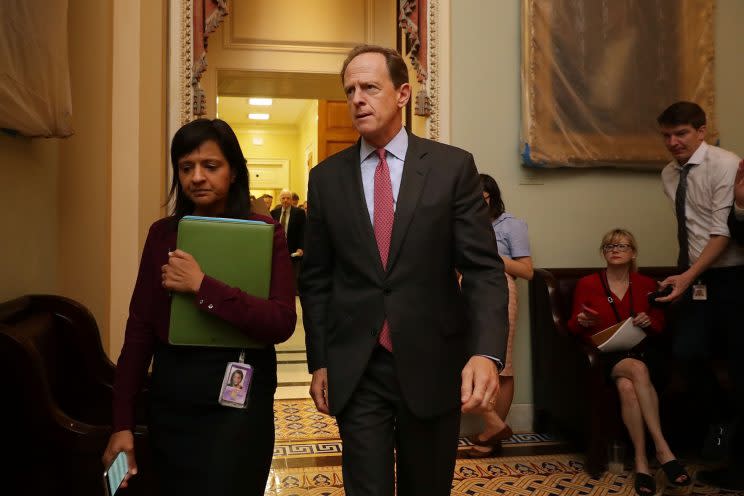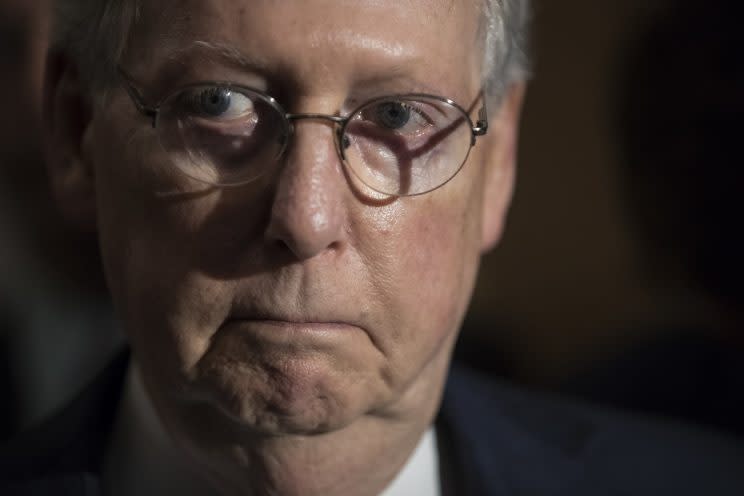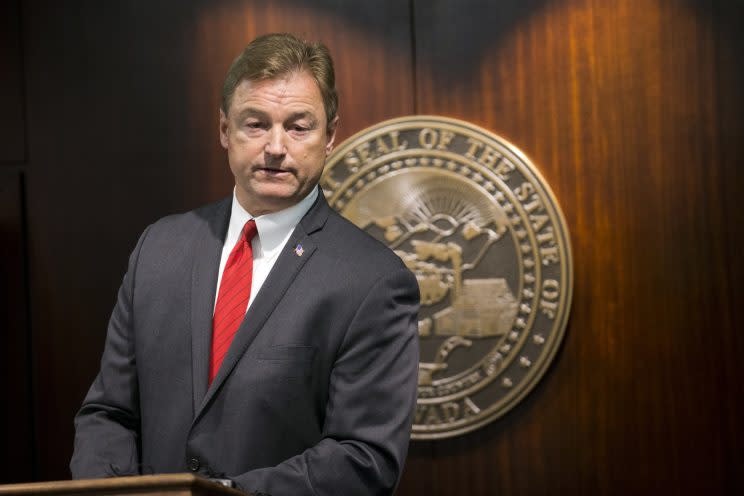GOP lawmakers scramble to defend health care bill

Yahoo News‘ continuing coverage of the Republican efforts to repeal and replace Obamacare comes in the latest Health Care Declassified. We’ll combine our own reporting with the best insights from around the Internet to give you the latest on the future of health care in America.
~
Republicans are taking turns spinning the Senate’s long-promised health care bill to meet a self-imposed deadline of passing it by the end of the week, before Congress adjourns for the July 4 recess.
Top Trump officials and sitting GOP senators took to the talk shows over the weekend to counter widespread criticism of the recently released Better Care Reconciliation Act. Among the issues were future cuts to Medicaid and how many Americans would lose health insurance under the bill.
White House counselor Kellyanne Conway denied Sunday on ABC that the Senate’s health care legislation would cut Medicaid.
“These are not cuts to Medicaid, George,” Conway told host George Stephanopoulos. “This slows the rate for the future and it allows governors more flexibility with Medicaid dollars because they’re closest to the people in need. Medicaid’s imperative, its founding was meant to help the poor, the sick, the needy, the disabled children, some elderly women, particularly pregnant women. We are trying to get Medicaid back to its original moorings.”
Conway defended her claim Monday on “Fox & Friends,” stating that Medicaid would continue to be funded, and that if a person is “able-bodied and you would like to go and find employment and employer-sponsored benefits, then you should be able to do that.”
Secretary of Health and Human Services Tom Price backed Conway’s statement, saying, “We would not have individuals lose coverage.” And Sen. Pat Toomey, R-Pa., agreed: “No one loses coverage,” he said.

But the nonpartisan Congressional Budget Office reported Monday that 22 million fewer people would have insurance in 2026 under the bill than under the current law. That’s a slightly better outlook that the CBO’s prediction earlier this year for the House’s version of the bill, which projected that 23 million fewer Americans would have health insurance.
Toomey also argued that the legislation would “codify and make permanent the Medicaid expansion.”
But the GOP bill would actually slash funding to Medicaid, marking one of the Republicans’ attempts to walk back the Obama administration’s efforts to fund health care for more low-income individuals.
President Trump, who has lauded the Senate’s bill on social media, tweeted earlier this year that “ObamaCare is a complete and total disaster – is imploding fast!” Earlier this week, the president offered up more criticism of the Obama-era policy, calling it “broken” and “dead.”
But a recent Kaiser Health Tracking poll suggests that the public would disagree with the president’s claim that Obama’s health care plan is “dead,” reporting that about half of those surveyed view Obamacare favorably. In contrast, only about 31 percent of the public view the House’s bill favorably, the poll reports.
Republicans have rushed to defend other aspects of the bill. Wisconsin GOP Sen. Ron Johnson suggested that individuals with preexisting conditions should pay more for their health care insurance, comparing them to cars involved in automobile accidents.
“We know why those premiums doubled,” Johnson said. “We’ve done something with our health care system that you would never think about doing, for example, with auto insurance, where you would require auto insurance companies to sell a policy to somebody after they crash their car.”
Republicans face a key week ahead in their battle to pass the long-promised health care reform. At least five Republican senators have expressed their opposition to the bill, leaving GOP leadership scrambling to win the support of 50 of the 52 Republicans in the Senate to secure its passage before their vote.
_____
Trump still believes House bill is ‘mean’
President Trump stood behind his characterization of the House health care bill as “mean” on Sunday, despite Speaker of the House Paul Ryan’s efforts to show the president supports the bill.
“Mean. That was my term because I want to see, and I speak from the heart, I want to see a bill with heart,” Trump said during an interview on “Fox & Friends.”
Despite reports that Trump had called the American Health Care Act “mean” during a private lunch meeting with GOP congressmen and asked them to amend it to make the bill “more generous,” Ryan claimed that the president still fully supports the bill.
“I don’t think that accurately reflects the president’s sentiments about the House health care bill,” Ryan said on Fox News’ “America’s Newsroom.” “I think that was some kind of a misinterpretation of a private meeting.”
Trump, however, says he stands by his initial assessment.
“Health care is a very complicated subject from the point that you move it this way, and this the group doesn’t like it. You move it a little over here. You have a very narrow path, and honestly, nobody can be totally happy, even without the votes,” he said. — Taylor Rogers
_____
McConnell, polio survivor, refuses to meet with March of Dimes

The Better Care Reconciliation Act and its predecessor, the American Health Care Act, have been met with heavy criticism from medical and patients rights groups since they were introduced. Last week, Senate Majority Leader Mitch McConnell refused to meet with many of those organizations, including the March of Dimes, which treated the senator for polio when he was a child.
When McConnell contracted polio at 2 years old, his mother took him to Warm Springs Hospital in Georgia to receive physical therapy that prevented him from losing his ability to walk, McConnell explained on the Senate floor in 2005.
“We were fortunate. Where my mother was living while my dad was overseas was with her sister in east-central Alabama, only about 40 or 50 miles from Warm Springs,” McConnell said.
“So my mother was able to put me in the car, go over to Warm Springs, and actually learn from those marvelous physical therapists who were there what to do,” he said.
The nonprofit organization that funded the hospital, National Foundation for Infantile Paralysis, later changed its name to the March of Dimes. It was one of 120 organizations that claimed to have asked to meet with McConnell regarding Senate Republicans’ health care bill while it was being drafted, only to be told that the Senate majority leader was too busy.
“Our organizations represent and provide care for millions of Americans living with ongoing health care needs who rely on Medicaid, and we cannot support policies that pose such a grave risk to patients and consumers,” the organizations said in an open letter to McConnell last week.
AARP, the American Heart Association and the American Cancer Society Cancer Action Network also signed the letter. — Taylor Rogers
_____
Quid pro quos rumored to secure votes

Amid increasing uncertainty that Senate Majority Leader Mitch McConnell has the 50 votes he needs to pass his health care legislation, there have been increasing reports that the potential naysayers may negotiate in exchange for their votes.
Sen. Dean Heller, R-Nev., is reported to be considering voting yes in exchange for eliminating the Yucca Mountain Nuclear Dump in his state, something he has repeatedly called for. Heller called the nuclear waste facility “a thorn in Nevada’s side” in an Energy and Commerce Subcommittee meeting in April.
“I believe this ill-conceived project would not only cause significant harm to the well-being of my home state and all Nevadans, but it also poses a national security risk that is too great to ignore,” Heller said.
Heller announced that he would not support the Better Care Reconciliation Act in its current form in a press conference on Thursday.
“It’s going to be very difficult to get me to a yes,” Heller said.
Heller is one of five GOP senators who have publicly said they do not support the health care bill. In order for it to pass, three of them would have to vote yes, assuming Vice President Pence acts as a tiebreaker. — Taylor Rogers
_____
Health insurance giant becomes bill’s first major supporter

Health insurance giant Anthem Blue Cross Blue Shield has publicly endorsed the the Better Care Reconciliation Act, despite widespread condemnations from medical and patients rights groups. The company said it believes the legislation will stabilize the market for individual healthcare plans, which was one of the bill’s major goals.
“We believe the Senate discussion draft will markedly improve the stability of the individual market and moderate premium increases”, Anthem said in a statement Monday afternoon.
Anthem cited market uncertainty as the major reason it pulled out of Obamacare markets in Wisconsin, Ohio and Indiana.
“Today, planning and pricing for ACA-compliant health plans has become increasingly difficult due to a shrinking and deteriorating individual market, as well as continual changes and uncertainty in federal operations, rules and guidance, including cost-sharing reduction subsidies and the restoration of taxes on fully insured coverage,” the company said in a statement.
Anthem still offers insurance in Obamacare markets in 11 states. It didn’t announce its plans for those markets. — Taylor Rogers
_____
Read more from Yahoo News:

